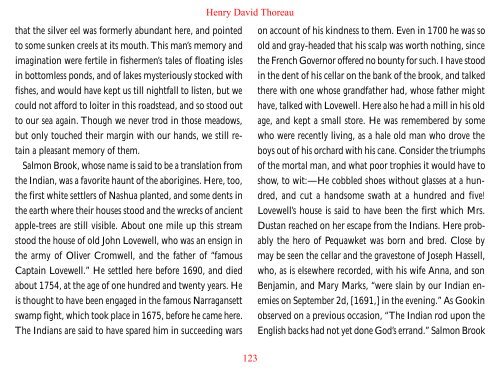A Week on the Concord and Merrimack Rivers - Pennsylvania State ...
A Week on the Concord and Merrimack Rivers - Pennsylvania State ...
A Week on the Concord and Merrimack Rivers - Pennsylvania State ...
Create successful ePaper yourself
Turn your PDF publications into a flip-book with our unique Google optimized e-Paper software.
that <strong>the</strong> silver eel was formerly abundant here, <strong>and</strong> pointed<br />
to some sunken creels at its mouth. This man’s memory <strong>and</strong><br />
imaginati<strong>on</strong> were fertile in fishermen’s tales of floating isles<br />
in bottomless p<strong>on</strong>ds, <strong>and</strong> of lakes mysteriously stocked with<br />
fishes, <strong>and</strong> would have kept us till nightfall to listen, but we<br />
could not afford to loiter in this roadstead, <strong>and</strong> so stood out<br />
to our sea again. Though we never trod in those meadows,<br />
but <strong>on</strong>ly touched <strong>the</strong>ir margin with our h<strong>and</strong>s, we still retain<br />
a pleasant memory of <strong>the</strong>m.<br />
Salm<strong>on</strong> Brook, whose name is said to be a translati<strong>on</strong> from<br />
<strong>the</strong> Indian, was a favorite haunt of <strong>the</strong> aborigines. Here, too,<br />
<strong>the</strong> first white settlers of Nashua planted, <strong>and</strong> some dents in<br />
<strong>the</strong> earth where <strong>the</strong>ir houses stood <strong>and</strong> <strong>the</strong> wrecks of ancient<br />
apple-trees are still visible. About <strong>on</strong>e mile up this stream<br />
stood <strong>the</strong> house of old John Lovewell, who was an ensign in<br />
<strong>the</strong> army of Oliver Cromwell, <strong>and</strong> <strong>the</strong> fa<strong>the</strong>r of “famous<br />
Captain Lovewell.” He settled here before 1690, <strong>and</strong> died<br />
about 1754, at <strong>the</strong> age of <strong>on</strong>e hundred <strong>and</strong> twenty years. He<br />
is thought to have been engaged in <strong>the</strong> famous Narragansett<br />
swamp fight, which took place in 1675, before he came here.<br />
The Indians are said to have spared him in succeeding wars<br />
Henry David Thoreau<br />
123<br />
<strong>on</strong> account of his kindness to <strong>the</strong>m. Even in 1700 he was so<br />
old <strong>and</strong> gray-headed that his scalp was worth nothing, since<br />
<strong>the</strong> French Governor offered no bounty for such. I have stood<br />
in <strong>the</strong> dent of his cellar <strong>on</strong> <strong>the</strong> bank of <strong>the</strong> brook, <strong>and</strong> talked<br />
<strong>the</strong>re with <strong>on</strong>e whose gr<strong>and</strong>fa<strong>the</strong>r had, whose fa<strong>the</strong>r might<br />
have, talked with Lovewell. Here also he had a mill in his old<br />
age, <strong>and</strong> kept a small store. He was remembered by some<br />
who were recently living, as a hale old man who drove <strong>the</strong><br />
boys out of his orchard with his cane. C<strong>on</strong>sider <strong>the</strong> triumphs<br />
of <strong>the</strong> mortal man, <strong>and</strong> what poor trophies it would have to<br />
show, to wit:—He cobbled shoes without glasses at a hundred,<br />
<strong>and</strong> cut a h<strong>and</strong>some swath at a hundred <strong>and</strong> five!<br />
Lovewell’s house is said to have been <strong>the</strong> first which Mrs.<br />
Dustan reached <strong>on</strong> her escape from <strong>the</strong> Indians. Here probably<br />
<strong>the</strong> hero of Pequawket was born <strong>and</strong> bred. Close by<br />
may be seen <strong>the</strong> cellar <strong>and</strong> <strong>the</strong> gravest<strong>on</strong>e of Joseph Hassell,<br />
who, as is elsewhere recorded, with his wife Anna, <strong>and</strong> s<strong>on</strong><br />
Benjamin, <strong>and</strong> Mary Marks, “were slain by our Indian enemies<br />
<strong>on</strong> September 2d, [1691,] in <strong>the</strong> evening.” As Gookin<br />
observed <strong>on</strong> a previous occasi<strong>on</strong>, “The Indian rod up<strong>on</strong> <strong>the</strong><br />
English backs had not yet d<strong>on</strong>e God’s err<strong>and</strong>.” Salm<strong>on</strong> Brook

















